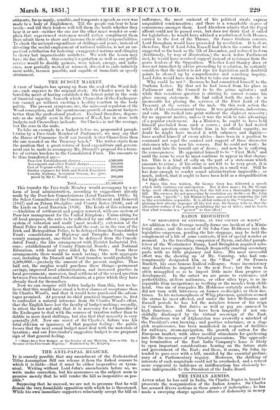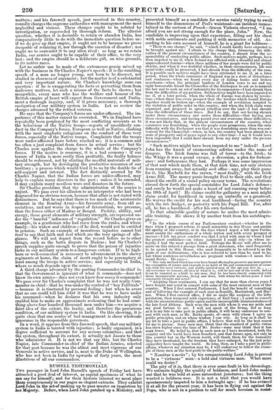THE INDIAN ARMIES. Arrini what he has said in India,
Sir Charles Napier is bound to prosecute the reorganization of the Indian Armies. Sir Charles has accused divers sections in those armies of indiscipline; he has made a sweeping charge against officers of dishonesty in money matters; and his farewell speech, just received in this country, roundly charges the supreme authorities with management the most neglectful and vicious. These charges ought to be refuted by investigation or superseded by thorough reform. The ulterior question, whether it is desirable to retain or abandon India, has comparatively little to do with the immediate question before us: if we do give up that empire, it ought not to be because we prove incapable of retaining it, nor through the coercion of disaster; nor ought we to surrender it to any alien rival : so long as we retain India, our armies ought to be capable of their office, to the very last ; and the empire should be a deliberate gift, on wise grounds, to its native races.
Let no unfair use be made of the extraneous gossip mixed up with the business in Sir Charles Napier's speech : it is the rambling speech of a man no longer young, not born to be discreet, not studied in closeness of argument ; but the matter is of a substantial and very important nature. Sir Charles's knowledge none can question : if he is exaggerating the facts or perverting them from malicious motives, let such a misuse of the facts be shown ; but meanwhile, every man who has the welfare and honour of the British empire at heart will expect from Government and Parlia- ment a thorough inquiry, and, if it prove necessary, a thorough castigation of our military system in India. Let us review the charges advanced by the retired veteran.
He says that the Company's forces are under-officered. The im- portance of this matter cannot be overrated. We in England have repeatedly been perplexed by the most conflicting accounts as to the behaviour of the Native troops—reports of unsoldierly con- duct in the Company's forces, European as well as Native, clashing with the most emphatic eulogiums on the conduct of those very forces, especially of the Native troops. Complaints that the troops were under-officered have before reached us ; it is a common and too often a just complaint from forces in actual service ; but Sir Charles now applies the charge to the whole of the Company's forces. If the motive is economy, it is a bad economy : if our tenure of India is more costly than profitable, the faulty balance should be redressed, not by stinting the needful materials of mili- tary strength, but by developing the productive resources of our territory ; a process which would bind it to us by the double tie of self-support and interest. The fact distinctly, averred by Sir Charles Napier, that the Indian forces are under-officered, may help to explain many disasters in the past ; unless it be amended, it may explain many needless wars and disasters in the future. Sir Charles proclaims that the administration of the armies is unjust. We pass over his allusion to an interpreter who had been disgraced for no obvious reason, because that affair is not stated with distinctness. Bat he says that there is too much of the aristocratic element in the Bombay Army—his favourite army, from old as- sociations and not worse in respect of favouritism, we presume, than the forces either of Madras or Bengal. Probity, ability, and energy, those great elements of military strength, are repressed un- der the " baneful " influence of "regulation." Sir Charles gives an example, in a gentleman who had risen from the ranks, and whose family—his widow and children—if he died, would not be entitled to pension. Such an example of monstrous injustice cannot but tend to sap that faith and zeal which are the very springs of alle- giance. We will not depart from the record before us to other things, such as the batta dispute in Madras ; but Sir Charles's speech supplies quite enough to prove that the poison of injustice lurks in our military system to a dangerous extent. If to be high- born or well-connected is necessary to advancement in the showy regiments at home' the claim of merit ought to be peremptory at least among the troops in active service; and especially in India, where so much depends upon the armies.
A third charge advanced by the parting Commander-in-chief is, that the Government is ignorant of what it commands—does not know its own armies—does not even know how many it commands ! We pass over Sir Charles's complaint that he was not really Com- mander-in-chief—that he was under the control of "boy Politicals " —because it is tinctured by personal feeling ; but when he avers that no one could tell him what it was that lie was to have under his command—when he declares that his own industry only enabled him to make an approximate reckoning that he had some- thing above four hundred thousand men under him—we acquire a faint idea of the extent, the laxity, and therefore the precarious condition, of our military system in India. On this showing, it is 9uite clear that one source of bad management is sheer wholesele ignorance in the responsible governors.
In a word, it appears from this farewell speech, that our military system in India is tainted with injustice ; is badly organize& in a degree sufficient to account for any serious calamities ; and that the system, throughout its extent, is actually not known to those who arlminister it. It is not we that say this, but Sir Charles Napier, late Commander-in-chief of the Indian Armies, selected for that post because he was the ablest and most vigorous of our Generals in active service and is, next to the Duke of Wellington, I who has not been in India for upwards of forty years, the most alustrious of all our commanders.



























 Previous page
Previous page